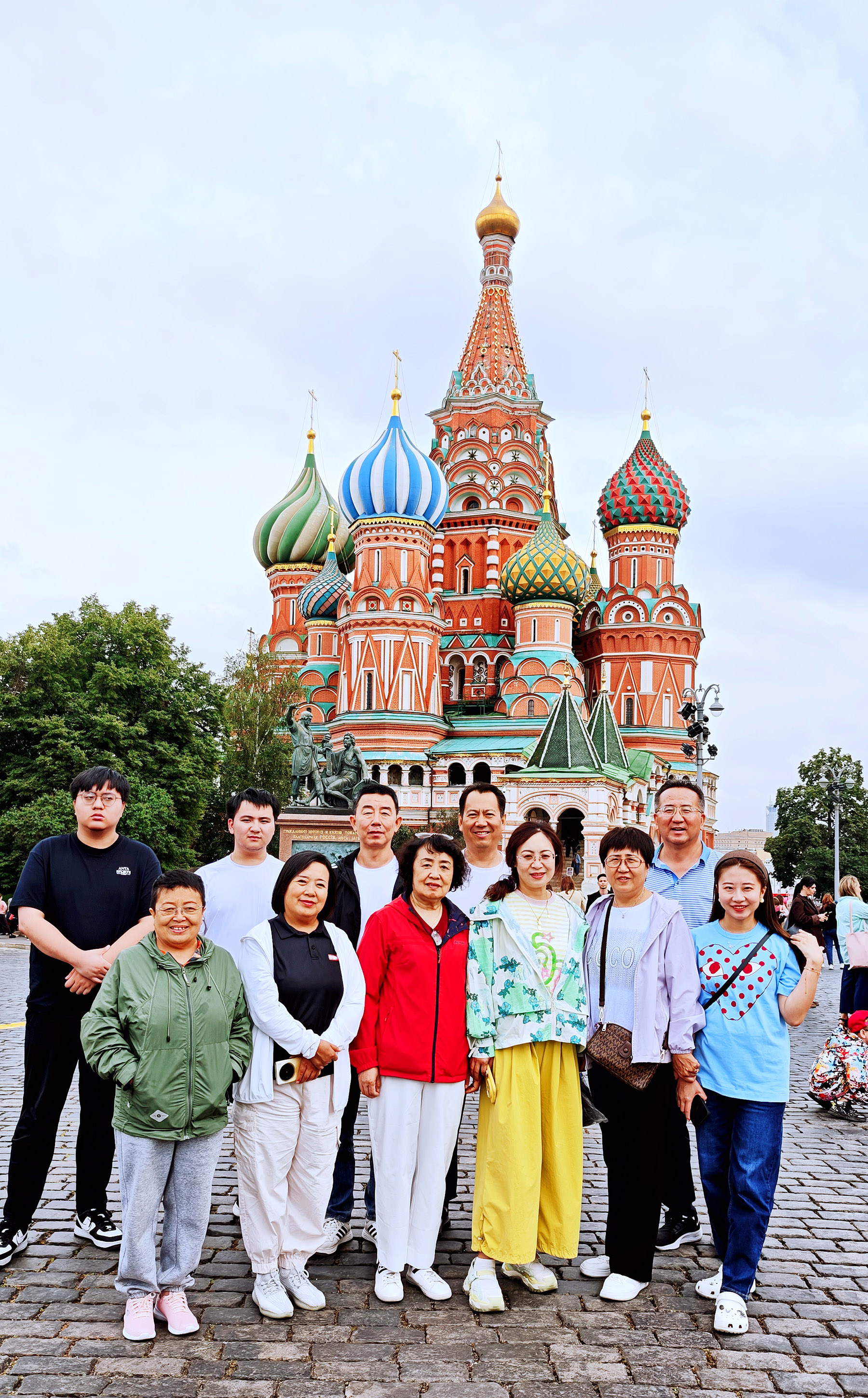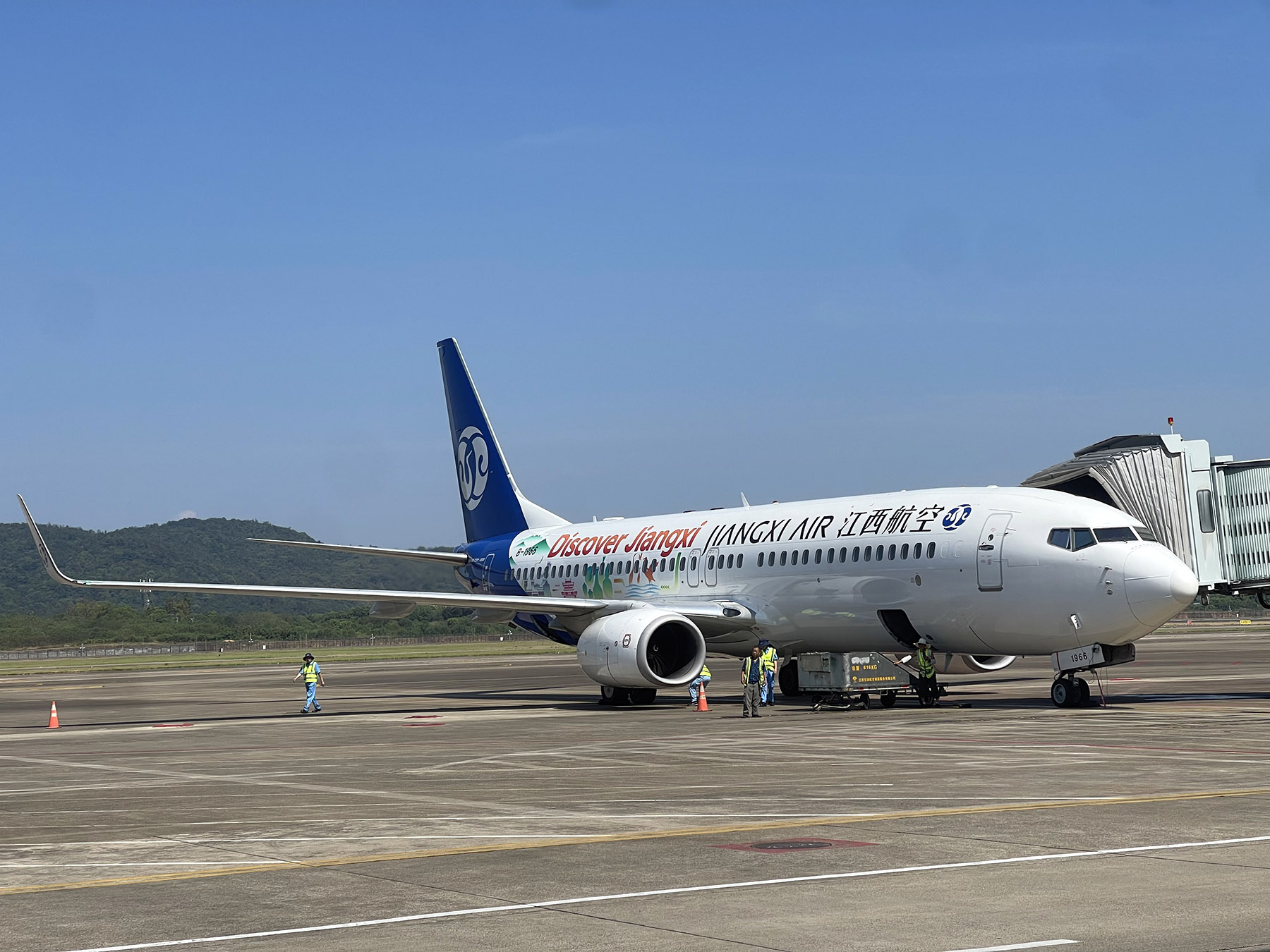In a new phenomenon, many tourists are taking bullet trains to smaller cities in China to catch much cheaper flights for their vacations abroad

Yang Xiuli can't stop talking about this wonderful deal she got while traveling to Thailand recently. Earlier this month, the 26-year-old traveled from Beijing to Datong in Shanxi province by train and from there flew to Bangkok, Thailand. The round-trip flight for two from Datong to Bangkok cost only 890 yuan ($125.27).
"On a high-speed train, the journey from Beijing to Datong (340 kilometers) takes less than two hours, the same time it takes to get from Xizhimen to Daxing airport (a little over 50 km) in Beijing by taxi, but the airfare from Datong to Bangkok is less than half the airfare from Beijing to Bangkok. Missing out on such a deal would have been foolish," Yang said.
READ MORE: Outbound tourism surges as young Chinese seek unique experiences
"Even though these tickets cost less, the airline didn't compromise on punctuality, basic services, or flight safety. We had a comfortable flying experience both to and fro. In fact, the cheap tickets were a smart choice — the money we saved allowed us to spend more on food and other experiences in Thailand, offering us greater value for money," she said.
And theirs wasn't an isolated case.
Cheaper gateway
While standard airfare between major cities can be high, young travelers like Yang are changing the tourism economics by employing creative strategies, such as by combining bullet train travel with newly launched regional airport routes that cost 70 percent cheaper than when flying from major cities.
Thousands of young people from big cities like Beijing and Shanghai are taking high-speed trains to second- and third-tier cities like Datong and Yuncheng in Shanxi province and Linyi in Shandong province to catch newly launched direct international flights. Using such routes they are able to fly to destinations like Bangkok, Moscow, and Seoul for half the usual price or even less.
The Datong Yungang International Airport actually exceeded Yang's expectations. "From entering the airport to reaching the boarding gate, it took us just 10 minutes. It takes longer to walk from security check to the boarding gate at Beijing's Daxing airport," she said.
The efficiency of this small airport is its biggest advantage. There are no long lines or complex pathways, allowing travelers to come and go almost as they please. The service at the airport is equally good. "The staff at the airport proactively offer guidance and are very patient," Yang said.
This efficient and convenient experience is also why more young people are choosing to fly overseas from smaller city airports. Compared to long lines and waits at major international airports in Beijing, Shanghai, Guangzhou, and Shenzhen, these smaller airports provide a relaxed and enjoyable travel experience.
Ticketing apps indicate that round-trip flights from Beijing to Bangkok cost around 2,300 to 2,400 yuan. However, departing from Datong, including the high-speed train ticket from Beijing to Datong, brings the total round-trip cost per person to only 600-700 yuan.
Smart deals
For young travelers, it isn't just about finding a good bargain; it's also about making smart consumption choices.
"When young people can travel abroad at a lower cost, why not?" said Sun Jiashan, a researcher at the Central Academy of Culture and Tourism Management. He believes this trend cannot simply be defined as "budget travel" or consumption downgrade.
"When the new generation views overseas travel as a regular consumption choice, they focus more on the value of their travel experience. This actually represents an upgrade in cultural consumption — they have higher demands for the quality and intrinsic value of travel," Sun said.
This phenomenon has parallels in the "grand tour "culture that has existed in Western countries for a long time, he said.
Sun mentioned that during a recent conference in Thailand, he observed many "digital nomads", or remote workers, from Western countries choosing to live long-term in Thailand, where the cost of living is relatively low, instead of indulging in luxury consumption.
Moreover, the availability of low-cost tickets is a result of a combination of government subsidies and market mechanisms.
Many of Datong's international routes are contracted by Shanxi Baohua Travel Agency, with most flights chartered for group tours. When there aren't enough group travelers, the agency sells the remaining seats online at low prices, often accompanied by government subsidies, according to local media reports.
Zhao Sikai, a route manager at Shenzhen Airlines' Changsha office in Hunan province, confirmed this model: "Part of the reason is that local governments provide route subsidies to stimulate local tourism and the economy, effectively reducing the airlines' operational risks and allowing them to offer ultra-low-cost tickets."
This model is spreading across the country. Tickets on routes like Yuncheng to Japan's Nagoya, Linyi to Osaka, and Jinan in Shandong to Seoul cost significantly lower than that for direct flights from first-tier cities.
At the end of August, Nanchang in Jiangxi province resumed direct flights to Kuala Lumpur, Malaysia, with one-way tickets costing only a few hundred yuan, and each flight saw over 90 percent occupancy.
Before the National Day holiday, international flights from Changsha and Zhangjiajie in Hunan province to popular overseas destinations like Seoul and Bangkok were priced only between 600 and 800 yuan.

Tourism boost
Additionally, these cheap flights are also luring foreign tourists.
From January to August this year, Chinese immigration authorities processed a total of 460 million border crossings — marking a 14.9 percent surge year on year. Notably, arrivals by foreigners surged 27.8 percent (over 50 million) during this period. Within this group, 240-hour visa-free entry approvals reached nearly 16 million travelers.
On the evening of Aug 25, a Malaysian tourist surnamed Yang flew from Kuala Lumpur to Jiangxi. He said it's much more convenient for foreigners wanting to visit Jiangxi this way. Earlier, they had to first fly to Beijing, Shanghai or Guangzhou and then to a tier-II or tier-III city. "Traveling to Jiangxi used to be quite cumbersome when there were no direct flights. This province has many beautiful cities, like Shangrao and Jingdezhen. The pictures we saw online is truly stunning, and we're excited to explore," Yang said.
This aligns with the observations of Li Gaochao, assistant general manager of Shanxi Baohua travel agency: "The significance of opening international routes in Datong is more about 'bringing in'. Through these international flights, we have attracted inbound tourist groups from Mongolia, Thailand, Russia, and other countries."
Datong's implementation of a 240-hour visa-free transit policy last year has further enhanced its appeal, according to Li.
"Allowing foreign tourists to choose Datong as their entry point into Shanxi province and encouraging them to spend more time traveling in Datong has increased inbound tourism in Datong and Shanxi," Li said.
Interestingly, travelers choosing to depart from Datong aren't all young people. Zhang Haifeng, marketing manager at Datong Yungang International Airport, said that the type of travelers varies depending on the destination and season.
"Younger people and students make up a higher proportion of those traveling to South Korea, while there are more older groups traveling to Russia. During peak holiday season, there are more families with children; on weekdays, there are more retirees and older travelers," Zhang said.
This diverse customer structure gives international routes from tier-II and tier-III city airports greater resilience in tourism. Even during the off-peak season, there is a stable customer base to support flight operations.
Last year's hit game Black Myth: Wukong brought a flood of attention to Datong. Several of Datong's attractions, featured as locations in the game, quickly became popular spots for social media check-ins. Datong has also become one of the must-visit "hidden gem" cities.
Local residents have noticeably felt the change. To make parking easier for self-driving tourists, lawns inside Datong city have transformed into parking lots; many new hotels have sprung up, and the frequency of locals dining at restaurants inside the city's walls during holidays has reduced.
A local netizen explained it thus on social media platform Xiaohongshu (RedNote): "First, we want to make room for visitors, and second, because the restaurants are, anyway, too crowded."
Introducing cost-effective international direct flights is also an attempt to improve Datong's economy. The idea is to lure tourists by offering cheap tickets and give a boost to the local hotel and dining sector, as also other forms of consumption.
Zhang Xiaojing, a tour guide from Shanxi with 20 years of experience in travel agencies, has witnessed the positive changes brought about by the opening of these international routes. "For us, the increase in outbound tours provides us more job opportunities. I'm proud to offer services and assistance to travelers going abroad," Zhang said.
She believes these international routes will attract more foreign tourists to Datong and Shanxi, "which will certainly promote the development of local tourism and other industries, increase employment opportunities, and make Datong and Shanxi internationally renowned cultural and tourist destinations sooner rather than later".
Booming outbound tourism
According to the Ministry of Culture and Tourism's statistical survey report for the third quarter of 2024, the outbound tourism market is steadily recovering after the COVID-19 pandemic.
In the third quarter of 2024, outbound tourism accounted for about 9 percent of the total tourism market, up from 5 percent in the fourth quarter of 2023.
Although it has not yet returned to pre-pandemic levels — in the fourth quarter of 2019, outbound tourism accounted for 22 percent of the total tourism market — the recovery momentum is clear.
The emergence of low-cost international tickets is giving a strong boost to the recovery of the outbound tourism market. According to ticketing platform data, the recent increase in bookings for international flights marked "departing before National Day" is evident, with inquiries and bookings for popular destinations like Bangkok and Seoul particularly prominent. Low-cost tickets are becoming a key factor in attracting travelers to plan their trips in advance.
ALSO READ: Cheaper international airfares make outbound tourism soar
However, whether this low-cost model is sustainable remains a question. Li said: "Discounted tickets are just one way for airlines to lure customers and promote sales, with only a limited number of passengers available for each flight. But adjustments will be made based on actual conditions later."
In this wave of "bargain travel", young people are redefining the value of travel with their actions. For them, travel is no longer a luxury but a smart lifestyle choice.
As Yang indicated, the money they saved allowed them to spend more on food and other experiences in Thailand. She has already planned her next trip: "Datong also has flights to and from Russia. I'm already planning a trip to chase the northern lights in Russia."
Yang also plans to go back to Datong for skiing in winter: "The ski resorts are great, and the food and accommodation offer good value."
Contact the writers at zhaoruinan@chinadaily.com.cn


